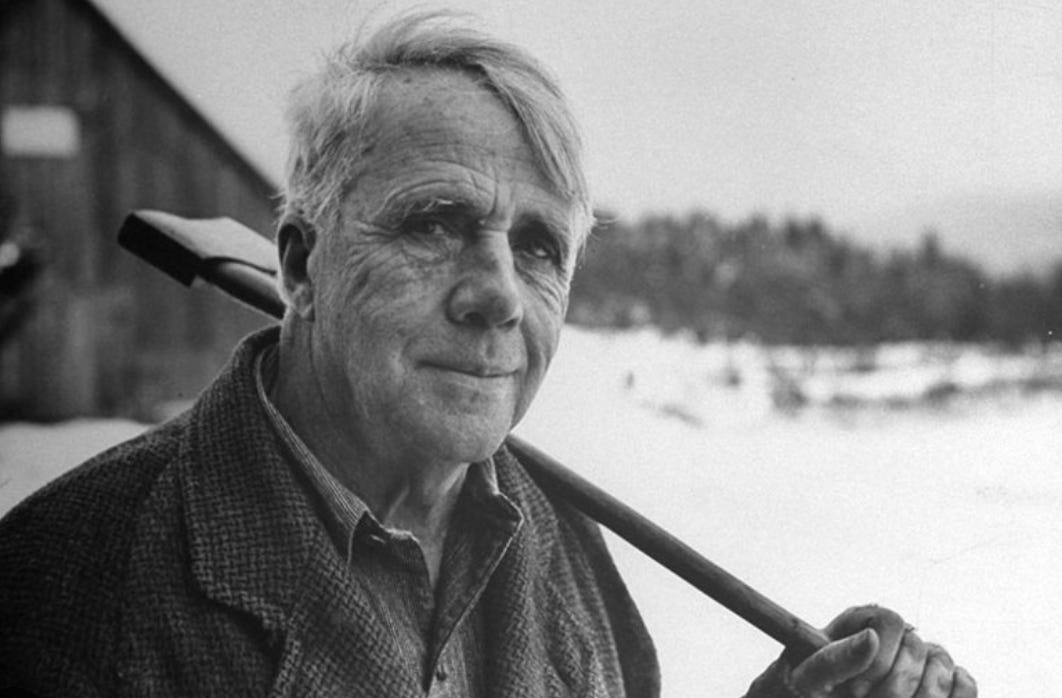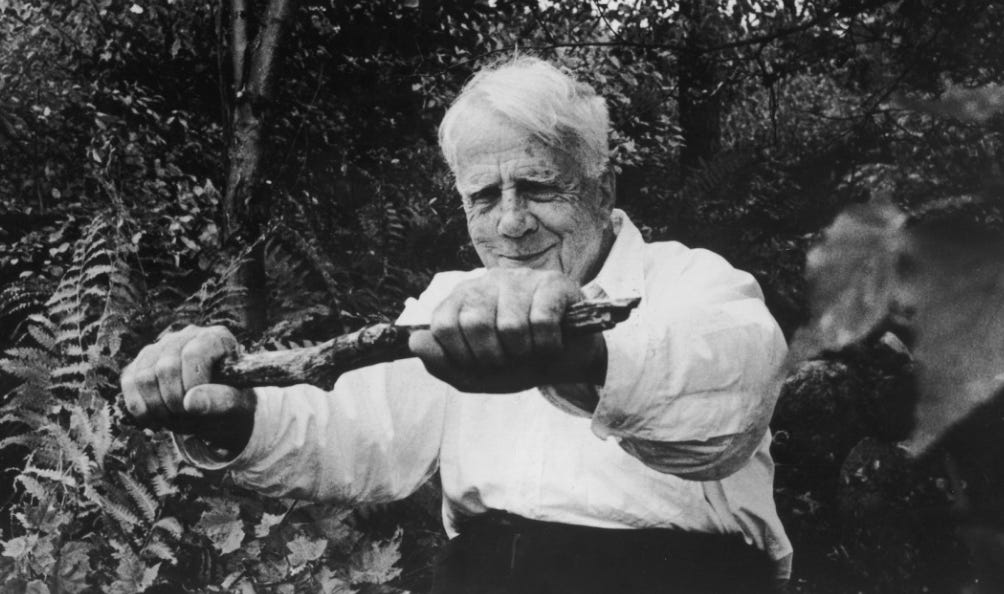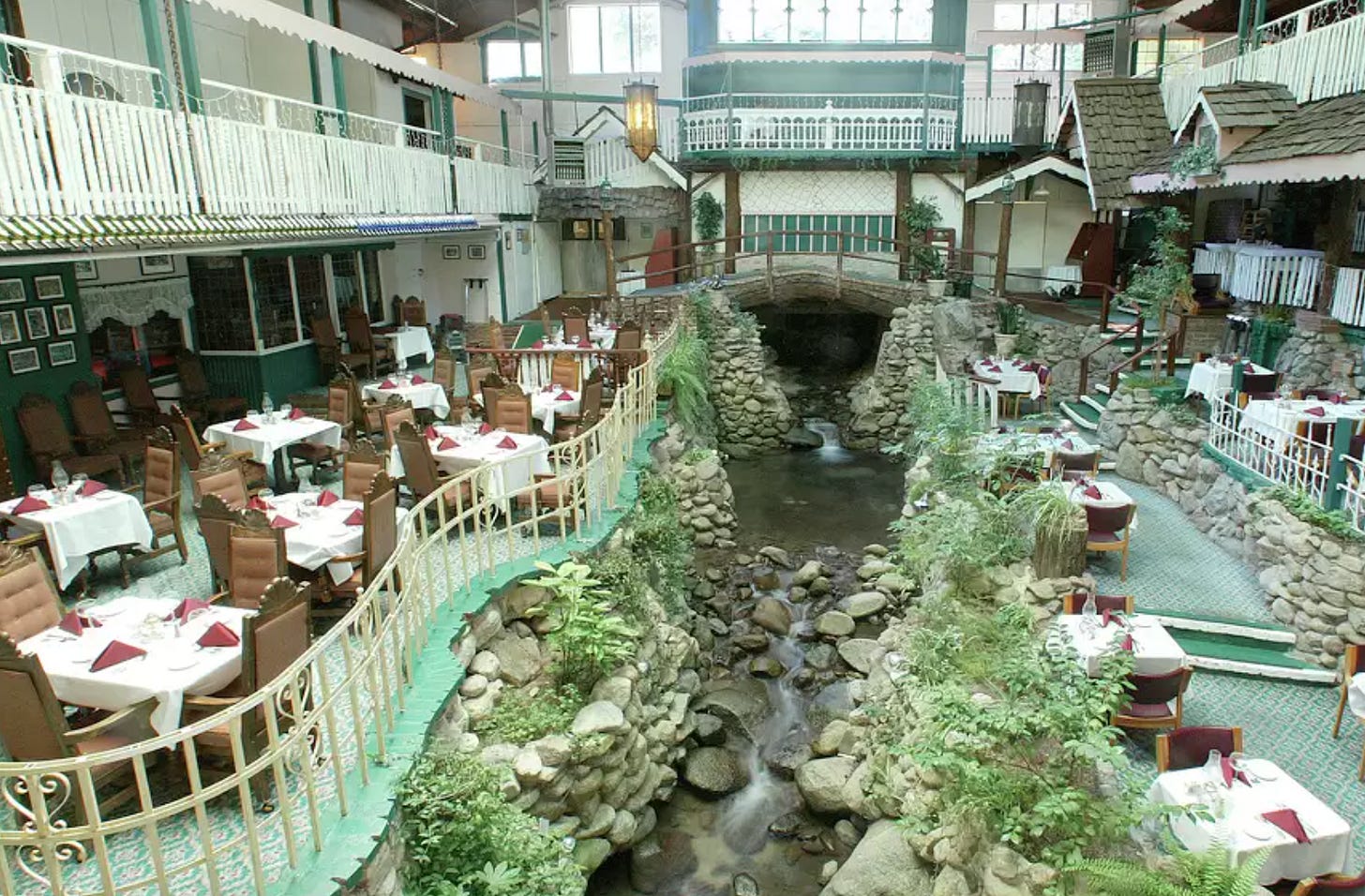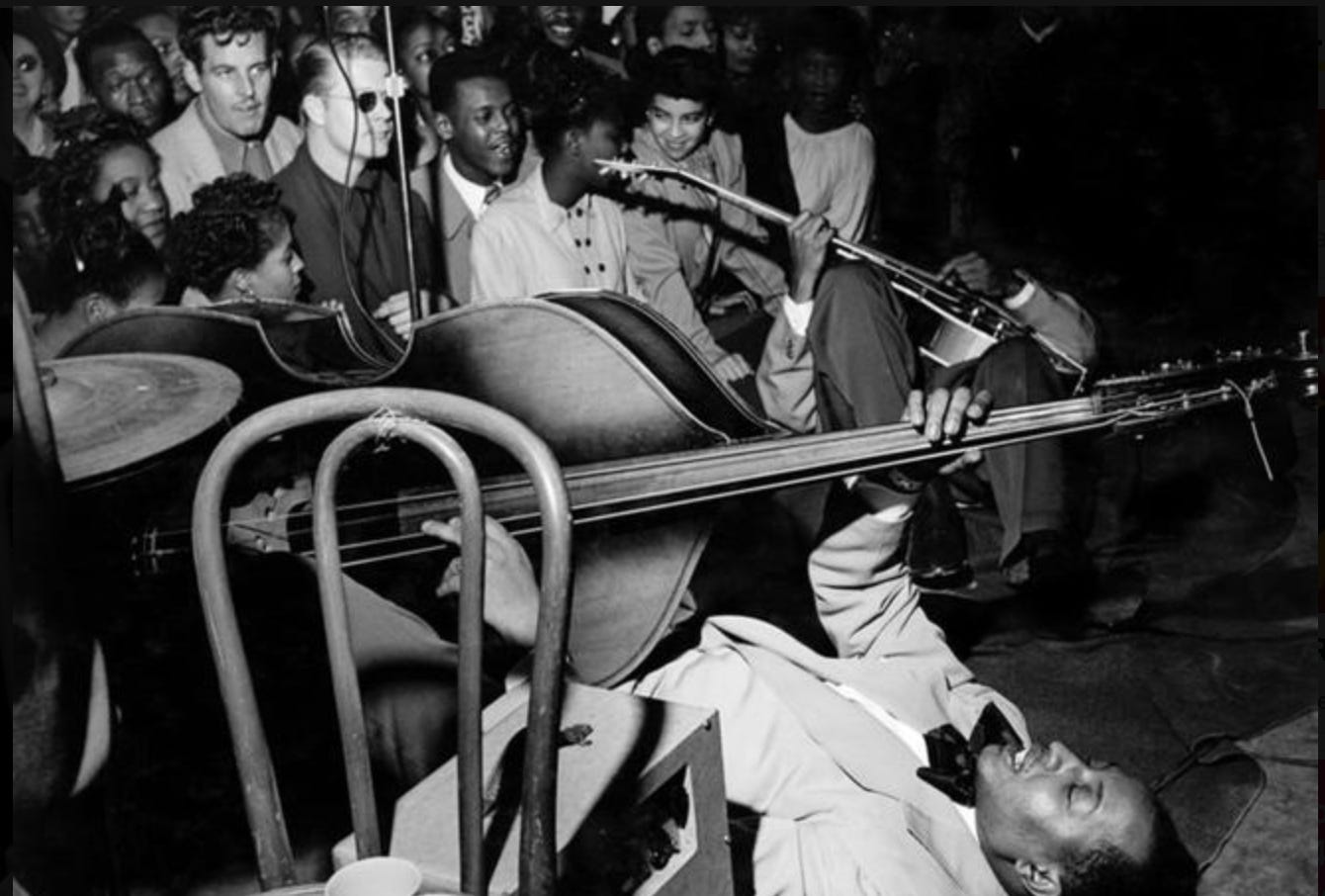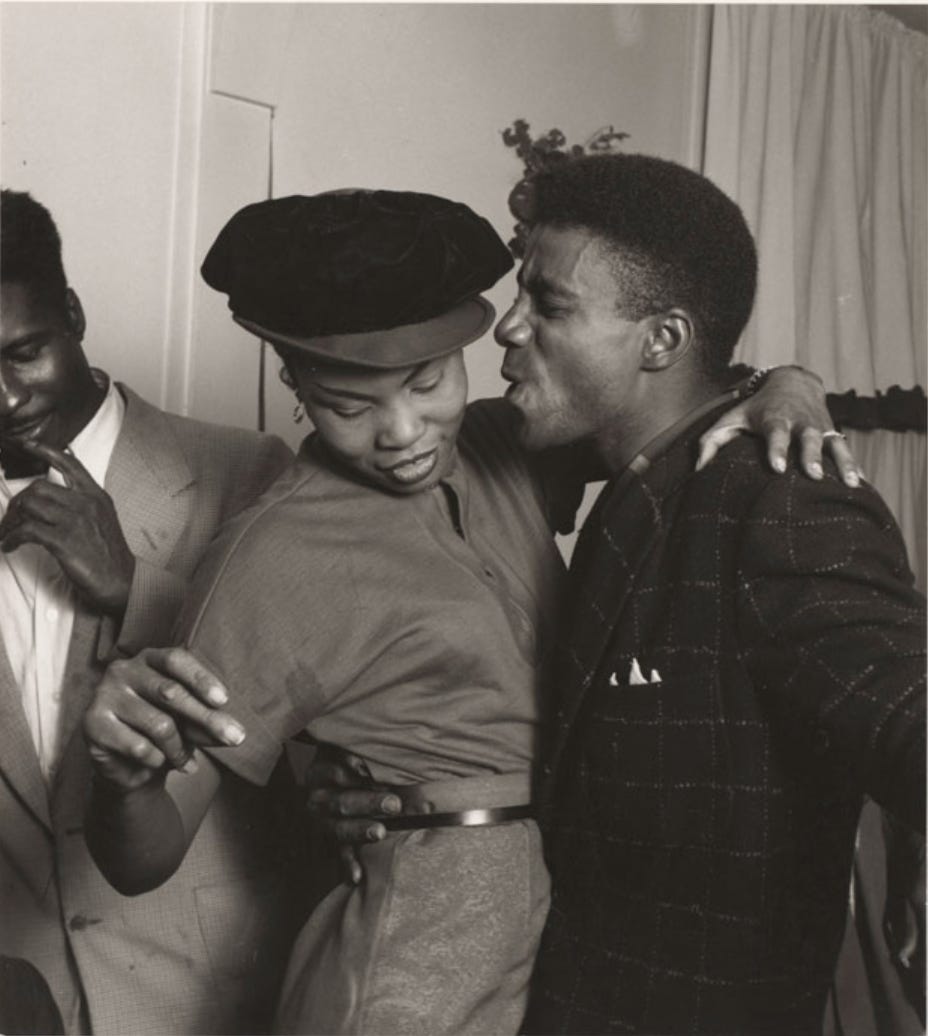Being Free, Being Bold: Robert Frost at 150 and The Road Never Taken
“In three words I can sum up everything I've learned about life: it goes on.”― Robert Frost
It was the mid-nineties. I was staying at my parents’ house, taking a well needed vacation from Warner Brothers and the streets of Los Angeles. During the morning in question, my parents were en route to Boston to see my brother. I had my old room to myself, listening to music like I did in high school, with the sun coming in through my windows that faced our back alley. The phone rang in my dad’s den, which tripped on the message machine, amplifying the voice of the caller on the other end. “Doris Katznelson (my mom), this is the Jewish Home. Your mother has had some form of heart incident and we are trying to get a hold of you.” I jumped up and grabbed the phone before the caller hung up. My grandmother was alive but unresponsive. It seems her heart was barely pumping blood, and they were not sure if she would be regaining consciousness.
As grandparents can be life’s greatest gift to a youngster, my grandma was that to me. Up until she moved into the Jewish Home, she lived just five blocks away from us. When I was young, and I knew she was coming over to visit (which was often), I would wait with excited anticipation by the window of our living room to catch that first sight of her walking primly around the corner.
Now I was in my twenties and came home regularly to visit my parents and to see her; on the day of the phone call, we already had plans to visit. My grandma and I would sit in the sunlit hallway of the first floor of the Jewish Home overlooking a garden while reading poetry. As her hearing got worse, we would sit and I would yell the poems at her (a different kind of poetry reading experience, to be sure), often loud enough to conjure other elders who pushed their wheelchairs up around us to listen as well.
We dug Theodore Roethke, thought Allen Ginsburg was strange and funny, didn’t really click with Emily Dickinson (whose poems did not sound great shouted) found Gabriela Mistral to be sweet, and fell in love, over and over again, with the poems of Robert Frost.
The Pasture
I’m going out to clean the pasture spring;
I’ll only stop to rake the leaves away
(And wait to watch the water clear, I may):
I sha’n’t be gone long.
You come too.I’m going out to fetch the little calf
That’s standing by the mother.
It’s so young,
It totters when she licks it with her tongue.
I sha’n’t be gone long.
You come too.
Frost was our main event. We always started with The Pasture…its short simple snapshot of a back country life a world away allowed for a deep breath and a separation from the world in front of us. We started with The Pasture, dug into a few of his longer poems, and ended triumphantly with our favorite (everyone’s favorite) The Road Not Taken, probably one of the most famous poems in the English language: “Two roads diverged in a wood. And I--I took the one less traveled by, And that has made all of the difference.” A seeming celebration of taking a different path in life. We would ask each other about the roads we took in our life path.
When I got to the Jewish Home on the morning of the call, I found my grandma in her room lying peacefully in her bed, breathing heavily and drawn, in a sleep-like state. Something had slowed…was slowing…her mid-ninety-year-old heart. I sat with her and held her worn, leathery hand, not moving but still with a life energy that I could feel through my skin. I sat with her, holding her hand for hours not really knowing what to do. I finally as visiting time ended but arrived right when the hospital opened the next morning to sit with her some more, finding her in the same state. I started reading her poetry. I started with Roethke…My Papa’s Waltz (a great one). I read her Sailing To Byzantium by Yeats, crying a little when he wrote about “every tatter” in a “mortal dress. I read her the Romantics: Keats, Wordsworth, Byron. Kubla Kahn. And finally, I got to The Road Not Taken.
Two roads diverged in a yellow wood,
And sorry I could not travel both
And be one traveler, long I stood
And looked down one as far as I could
To where it bent in the undergrowth;Then took the other, as just as fair,
And having perhaps the better claim,
Because it was grassy and wanted wear;
Though as for that the passing there
Had worn them really about the same,And both that morning equally lay
In leaves no step had trodden black.
Oh, I kept the first for another day!
Yet knowing how way leads on to way,
I doubted if I should ever come back.I shall be telling this with a sigh
Somewhere ages and ages hence:
Two roads diverged in a wood, and I—
I took the one less traveled by,
And that has made all the difference.
When I uttered that last line my grandma’s eyes opened, as if it contained the magic of a fairytale that brings back a princess from deep sleep. She turned her head and stared straight into my eyes uttering her first words in over two days, “Why did it make all the difference? WHY!?!”
The Road Not Taken is considered to be one of the most misread poems of all time. There is the general notion of us being in command of our fate, celebrating our free will to pave a path that is our own, separate from the one our parents walked, defying social expectation. Maybe that is the right read….it is certainly the one that I have leaned on for inspiration over the years. But many scholars take a much more nihilistic view. There are two paths. We want to travel both of them and they are both equally “fair” but we can only choose one. There is always the unknown opportunity, lost to fate. Resultantly, we are never able to truly have all of the experiences we so desire; we are victims of being mortal and only existing in three dimensions. Yes, the path we take does make all the difference—but Frost makes no judgement as to the positive or negative quality of that difference. There is no judgement to our choices, only an acknowledgement that we are forced to have choices and we must either choose to or cease to be a life traveler.
Wherever my grandma went for those two days, it made her question a poem we had read together for so long…question what the difference our choices bear upon us, and what are the ultimate effects our choices have on our lives. My grandma lived for another few years after her few days away, and we continued reading and talking about the poem, and changing our minds and reimagining our stories.
Today is Robert Frost’s 150th birthday. It is a testament to his brilliant artistry that his poems…his name…seem just as known now as they did during his lifetime. They are part of the tapestry of our existence…a link to our mortal chain.
Click here to hear Frost reading The Road Not Taken.
Frost, by the way was from San Francisco. There is a great story about his childhood at the Alta website. Very much worth a read.
After closures and controversy, Santa Cruz mountain resort awaits rebirth
The Brookdale Lodge! A haunted place, where certain guest rooms are always cold. The Ink Spots had a residency there in the 60s…underground noisemakers hosted shows there in the early aughts. And in between, it was a haven for bikers and outsiders in an otherwise deeply religious part of the forrest above Santa Cruz. The crown jewel of Brookdale was definitely its restaurant, with the river running through. Hopefully it will come to life again!
Writer/illustrator Edward Gorey’s library lands at SDSU
26,000 books all going down to San Diego. I hope they post a catalog!
An Interview with Amy Tan: Wild Birds and Backyard Journals
The Bay Area Nature Magazine interviews Tan…about her newfound appreciation and love for birds: “I do think that the birds afford stories that are tragic and comedic, very dramatic love stories, stories of betrayal—they’re all there.”
PHILL NIBLOCK (1933–2024) By Alan Licht
Niblock passed a short while back, but I loved this recent memoriam by artist Alan Licht…a beautiful, insightful piece on the master sound sculpturist. Alan’s 1990s band Love Child, that he was in with Rebecca Odes, Brendan O'Malley, and Will Baum, has a newly released compilation of their recordings (you know that the 90s are back in with the youngsters, right?). You can check it out here.
Painting the unpaintable: Gerhard Richter’s most divisive work returns to Auschwitz
“Richter’s pictures in a way are coming home, it’s a homage to the prisoners who made the photos. He tried in his own tradition to repaint the photographs and realised very quickly it was not possible. These photographs are unique, so he intended the cycle as a requiem to those who made the photographs.”
Modelling sound from wind turbines and drones to combat noise pollution
“While the annoyance caused by noise increases with the level of noise exposure, its development does not generally follow a simple law and depends on each noise source and its characteristics (continuous noise vs. impulse noise, low-pitched vs. high-pitched noise, etc.),” explains Olivier Doaré, professor at the Mechanics Unit (UME) at ENSTA Paris. “For these devices, the noise level in decibels is not significant, because the noise is not uniform. It is characterised by temporal fluctuations in amplitude, potentially linked to the weather, the shape of the blades, etc.”
Meet Dorothy Dean, the Forgotten Warhol Superstar of the 1960s
An interview with Anaïs Ngbanzo around her new book, Who Are You Dorothy Dean?
The Mending Wall
By: Robert Frost
Something there is that doesn’t love a wall,
That sends the frozen-ground-swell under it,
And spills the upper boulders in the sun;
And makes gaps even two can pass abreast.
The work of hunters is another thing:
I have come after them and made repair
Where they have left not one stone on a stone,
But they would have the rabbit out of hiding,
To please the yelping dogs. The gaps I mean,
No one has seen them made or heard them made,
But at spring mending-time we find them there.
I let my neighbor know beyond the hill;
And on a day we meet to walk the line
And set the wall between us once again.
We keep the wall between us as we go.
To each the boulders that have fallen to each.
And some are loaves and some so nearly balls
We have to use a spell to make them balance:
‘Stay where you are until our backs are turned!’
We wear our fingers rough with handling them.
Oh, just another kind of outdoor game,
One on a side. It comes to little more:
There where it is we do not need the wall:
He is all pine and I am apple orchard.
My apple trees will never get across
And eat the cones under his pines, I tell him.
He only says, ‘Good fences make good neighbors.’
Spring is the mischief in me, and I wonder
If I could put a notion in his head:
‘Why do they make good neighbors? Isn’t it
Where there are cows? But here there are no cows.
Before I built a wall I’d ask to know
What I was walling in or walling out,
And to whom I was like to give offense.
Something there is that doesn’t love a wall,
That wants it down.’ I could say ‘Elves’ to him,
But it’s not elves exactly, and I’d rather
He said it for himself. I see him there
Bringing a stone grasped firmly by the top
In each hand, like an old-stone savage armed.
He moves in darkness as it seems to me,
Not of woods only and the shade of trees.
He will not go behind his father’s saying,
And he likes having thought of it so well
He says again, ‘Good fences make good neighbors.’
Photographer David Johnson recently passed away. Here are just a few of the photos he took in The Fillmore district of San Francisco in the 1940s and 50s (hear him tell the stories behind his photos here)…
“Some say the world will end in fire,
Some say in ice.
From what I've tasted of desire,
I hold with those who favor fire.
But if it had to perish twice
I think I know enough of hate
To say that for destruction ice
Is also great
And would suffice.”
― Robert Frost




